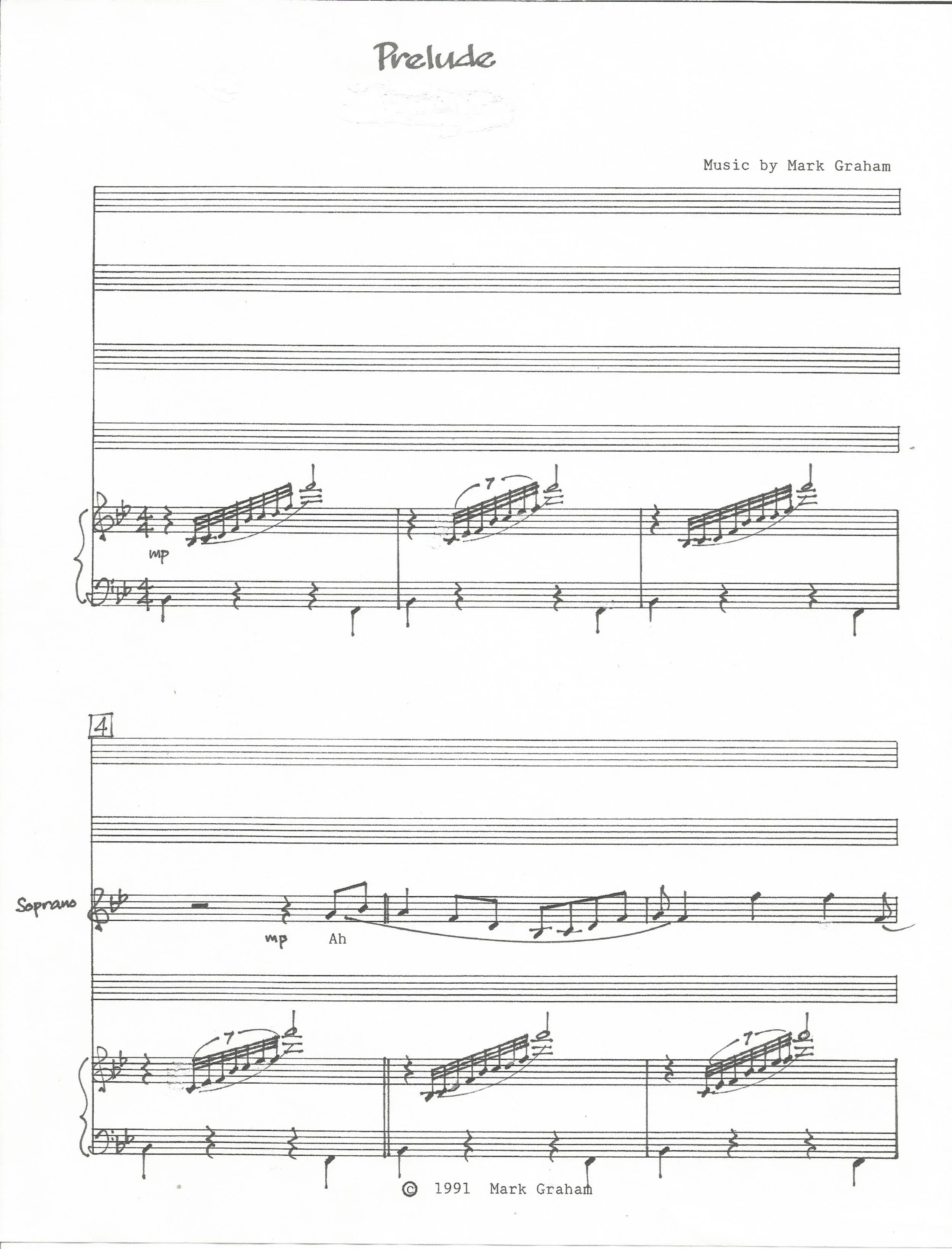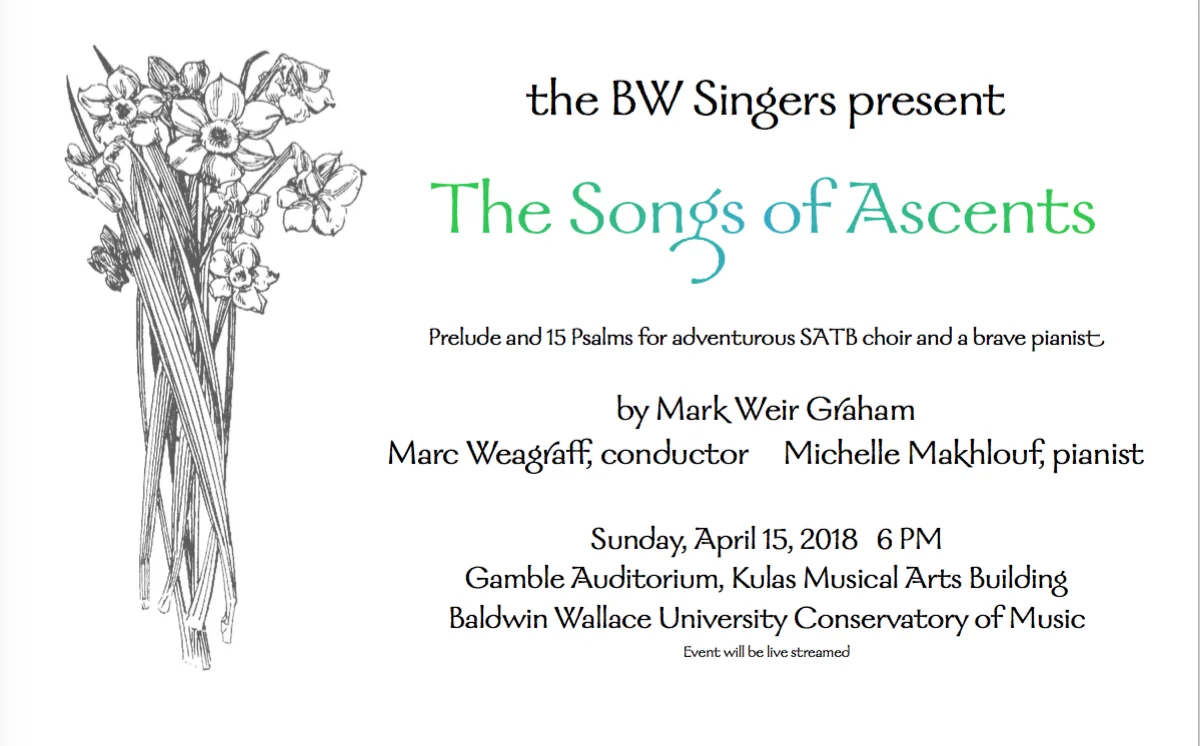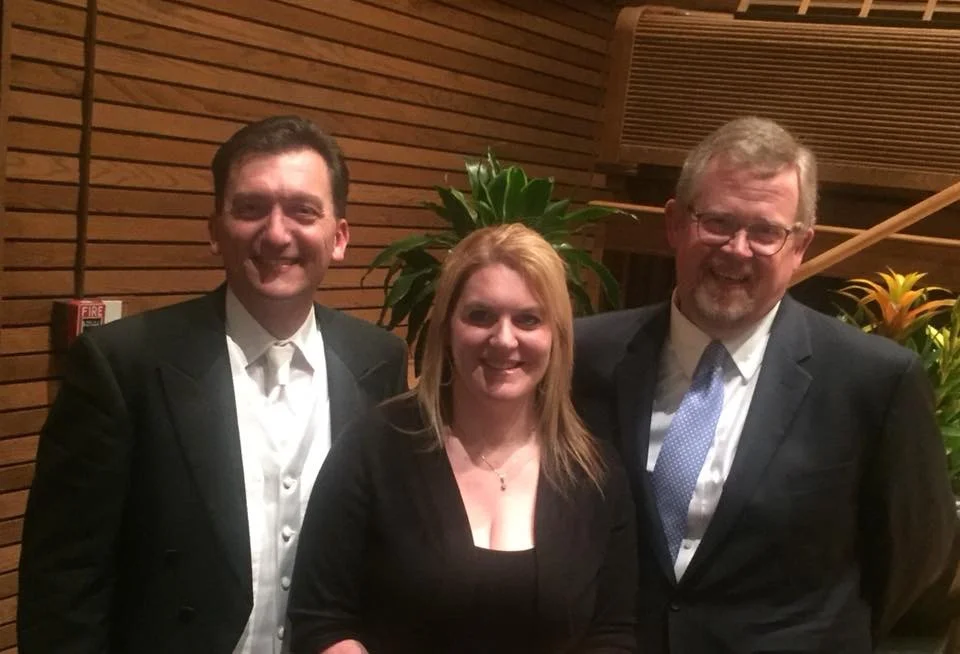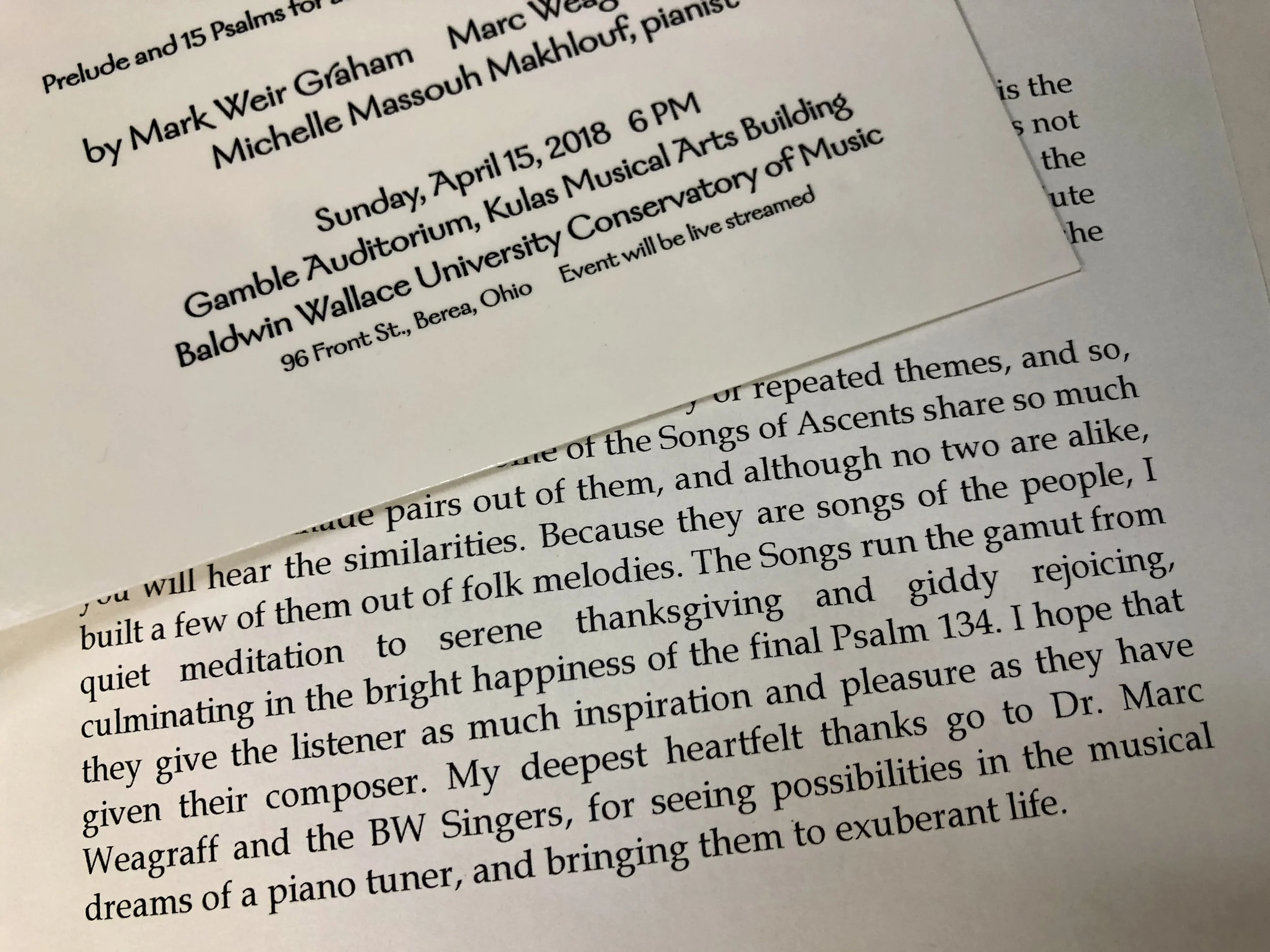I could almost believe the whole thing never happened, except for 2 things.
First, there's a great recording of both the audio and video (thank you, Bill Hartzell), and I revisit it at least once a week. Second... well, we'll get to that.
It was at least as far back as the 1980's that I was reading the Psalms, and noticed that Psalms 120 through 134 were grouped together in the Hebrew scriptures. Each one bears the title "A Song Of Ascents" (sometimes translated "degrees" or "steps"). No one really knows what this means; the most prevalent thought is that they were sung by pilgrims on their way "up" to Jerusalem for the annual festivals. But regardless, they are clearly a group, and the more I read them, the more I saw a cohesiveness and story and recurring themes, even though they were by different authors. And then they started singing to me, and I began to put them to music.
Few of us had computers then, and music notation software was in its infancy anyway. I actually had a drafting board with a special attachment for drawing my own manuscript paper, and wrote in pencil or ink and typed in the lyrics. (Click on the Gallery below to see other manuscripts.)
I worked on them off and on, over the years. I know I had a lot of them done by 1991, judging by correspondence with my sister Nancy, who is a graduate of the Westminster Choir College. But I never quite managed to finish the whole project. I had a lot going on, was paying off a mortgage, running a business, putting kids through school, facing some personal hurdles, etc. Finally, in 2017 I looked at the pile of music and thought, it's now or never. Really, other than editing, there were only two more psalms to write, and I made myself finish them. I added a vocalized Prelude without lyrics to the set, making a total of 16 pieces. It took some time to put it all into Sibelius notation software, but after doing so I could listen to the midi audio and get a somewhat mechanical idea of how the pieces would sound.
And then, what? I had them printed into booklets at good old BW publishing services, and sent them out to every choral person I'd ever met. Or stood near. Or thought about. I included a cover letter explaining the project and asking for advice and kind criticism.
I got two responses. One was from Dr. John Drotleff, who directs the West Shore Chorale here. He gave me some concrete suggestions, and plenty of positive encouragement. The pieces are quite difficult, and are really only suited for ensembles that have ample training and rehearsal time. And then, in December 2017 I got this email from Dr. Marc Weagraff at Baldwin Wallace University Conservatory of Music, my own figurative back yard.
I showed it to Thea, and it didn't take too long to answer. This is a couple of replies later.
And so it began. In January, the BW Singers began rehearsing the pieces. They're a wonderful ensemble of mostly conservatory students, many of them music ed or music therapy or music theater majors, joined by members of the BW community of various ages, all the way up to a gentleman in his 80's. I wasn't present at the first rehearsal, so I can only imagine the looks on their faces when they found out they'd be performing the piano tuner's composition.
At first I gave them space and stayed away, but gradually I began sitting outside the back door, and then I crept in and sat in the back of the room. Early on it became clear that Marc understood the music well and "got" the spirit of the pieces, so I left things up to his musical judgment and taste. Occasionally I would give a suggestion or point out errors in the manuscript. I was almost always smiling, and sometimes close to tears with emotion at hearing the music come together, and realizing there was something good happening.
The room where it happened. With lots of hats.
There was some uncertainty about when it would be performed, but eventually the time was set for Sunday, April 15th at 6PM, an awkward hour that was chosen to get around a conflict for pianist Michelle Makhlouf. Michelle turned out to be a godsend. The piano part naturally reflected my own playing style and huge hands, so it often includes reaches that many pianists don't have. Michelle's hands are normal-sized, but with a few modifications (to the music, not to the hands) we found ways to make it work. Most importantly, she too immediately found the spirit of the piece and flew with it.
By the time of spring break, things were coming together, and Marc and the choir had at least begun to work on all 16 pieces.
And about this time, something quite magical began to happen. One at a time, many of the singers began to really like the piece, and would sometimes even come and talk to me about it in enthusiastic terms. They began putting in extra work on their own, and taking pride in their ability to read what was clearly emerging as a difficult but fun piece. Publicity began building momentum, too; Marc and I were interviewed by WKSU for their Morning Edition show (you can access the website version here), and Bill O'Connell at WCLV/Ideastream also ran a radio interview. Baldwin Wallace did their own publicity. I think I began to realize it was really happening when I saw this on the TV in the lobby of the Boesel Musical Arts Center:
Somewhere around this time, soprano Cynthia O'Connell joined us for the solo part on Psalm 121. I wanted a professional voice so it could be heard over the choral accompaniment, and Cynthia sang it beautifully. Also at this time, Emily Quinn, our Conservatory Branding Manager (that title always makes me picture cowboys), came down to my office and took some photos, and used one of them in this cheery poster that we used for publicity around the community:
And then, the day approached. Rehearsals the week before were less than encouraging. People were missing entrances, singing parts incorrectly, dragging, and not following the conductor. We also had an interesting problem: we had more men than women, but during the semester tenors and basses had skipped class freely and often, so it wasn't a problem. Now, they all showed up, and there was some rebalancing to do.
Invitations were sent, Facebook, Instagram, and Twitter all carried the publicity, as did the BW website. We put the program together (the program notes are here, if you're interested, and perhaps you'd be interested in my bio as it appeared that day). And so, the day of the concert arrived. Our son and daughter had flown in with their spouses, and an unexpected number of relatives and friends found their way to Cleveland, including my sister Nancy to whom the pieces are dedicated. One faculty and choir member, Bob Mayerovitch, a valued member of the bass section, had his own piano recital at 4PM that day, but made it to our event. The hall filled, and the lights dimmed. You can experience the rest of it in this video. It starts with a small talk I was asked to give, and then there are about 50 minutes of music.
It happened. The choir members traveled over icy rainy roads to get there, but they came and, although the performance is far from note perfect, they truly captured the spirit of the music. It was a thrilling, once-in-a-lifetime experience for the piano tuner.
Dr. Marc Weagraff, pianist Michelle Massouh Makhlouf, and one very happy composer.
And then, it was over. I am trying to interest other choirs in performing the piece, and publishers as well, although there are hurdles which I understand: who, after all, would be interested in the music of a 65-year-old piano tuner? But it was a miracle that it happened at all, and I will always be grateful to Marc and Michelle and every single singer.
We did some more recording a week later. It was productive, and we were able to correct some whopping mistakes, but it doesn't hold a candle to the energy (and pitch) of the performance recording. There was a Wednesday after the concert but before the additional recording when Marc and the choir had time to lavish on nuances of the music, and there was something lovely about that day, maybe my favorite of all. The choir just seemed to settle back and sing without fear, and the beautiful results will just have to live in my memory.
I mentioned a second reason why I know it really happened. And that is this: even now, months later, participants in the event come up to me and share their enthusiasm and happiness and memories of not just the performance, but the process of putting it together. For me it ended up being a spiritual experience as well as an artistic one, and in their individual ways, I think many singers felt the same. The music forged a genuine bond between every person who helped make it happen, and thankfully there's the video so I can remember every one of them. It was, and had to be, a group effort, and together, we, the motley-assortment not-exactly-A-team choir and the piano tuner, pulled it off. We worked our tails off, and did so joyously and magnificently, and it was good! I like the music more every time I hear it, and am convinced it has a future in choral repertoire, whether I live to see it or not. But even more importantly, it was a joint labor of love that none of us will easily forget. Dreams do come true, even for piano tuners.












